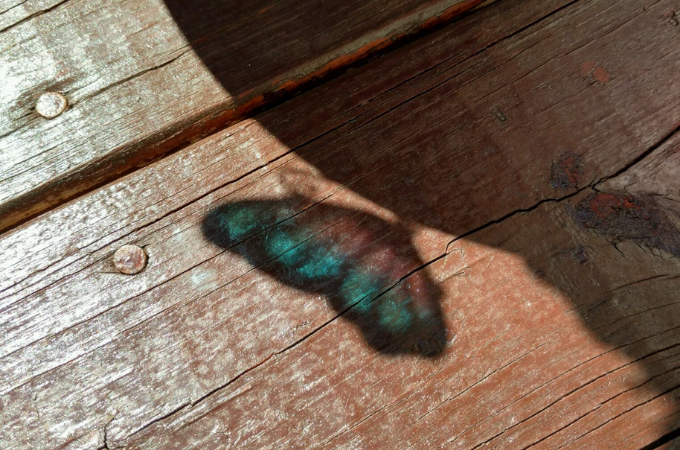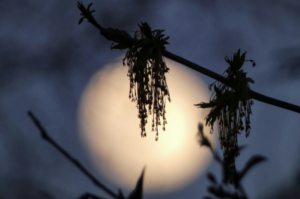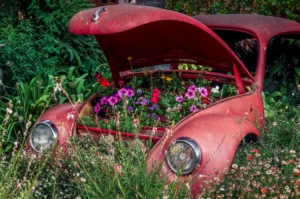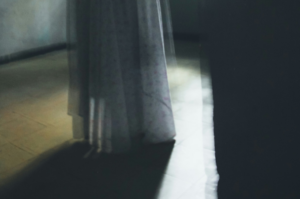
The child opens his palms and summons the darkness. It comes swiftly, mercifully, like a warm blanket he can’t sleep without. Around him, the giggles and scurrying footsteps of his classmates as they hasten to camouflage into the background. Some duck behind trees. Others sprint behind pocked walls with peeling white paint. Others behind rusting school buses. The child can hardly stand still as he counts, out of habit, his feet already anticipate the search. But his heart has only a shadow of interest. The smell of beef stew wafts into his nostrils, advertising itself from the cafeteria, but he has a full belly, so the smell wisps back out to seek a hungrier audience.
The child counts for longer than he needs to because the merciful blackness of his palms is the closest thing to peace. He relishes darkness because it offers rest from scowling at the sun. The day is cruel in its length and the sun offers no sympathy. Although what he needs sympathy for, he can’t say. He just knows he despises the tangerine ball in the sky for its unwavering commitment to rising and shining day after day, refusing to be swayed by whatever occurs beneath it. He lets his hands fall from his face, knowing his friends are growing restless; he doesn’t want to ruin the game for them. But somewhere along the way – and he doesn’t know when or how – the idea of play has lost its shine. He pops his eyes open and recoils from the sunlight, then sets his quick feet to finding his friends.
The school grounds hum with activity. Wherever he turns, he sees children like him, dressed in forest green shorts, pants, skirts, white shirts, and black shoes. On a hot day like this, most opt for short-sleeved shirts. But the outliers sport the long-sleeved versions like a prize awaits them at the end of the sleeve. And the over-killers don the black school vest over their shirt, with the red school crest emblazoned on the breast. He notices the numbers seem to dwindle every day. Familiar faces are absent almost daily now and the air, once cacophonous, now simmers to a hum.
He sprints past a frantic game of football on the field, peering behind goalposts. Then rushes past some older students sprawled on the grass, one of them, glossy-lipped and smooth-haired winks at him and points towards the nearest tree. The child is in the second grade but already his face heats up under the spotlight of female attention. He grins awkwardly and approaches the thick tree. Some tittering and a triangular patch of sleeve gives his friends away. He rounds the trunk to find two of them huddled sideways facing each other and they nearly burst his eardrums with their excitement. They join him in his search for the rest, and the four extra eyes give him super-vision; he sees through walls and garbage bins and school buses and soon all are accounted for. It’s now someone else’s turn to seek and his chance to quietly slip away.
No bells ring signalling the beginning or end of things, and no teachers strut out to usher the children grudgingly back to class. He finds this odd. And senses it’s the new normal. Time stretches and folds. The child feels a bitterness brewing inside him as he watches his peers from the sidelines. He envies the lightness of their feet and the frothiness of their laughter. His own feet feel like they’re dragging through water and when he forces laughter, smoke comes out of his mouth and needles sting his throat and make his eyes water.
Seeking his own lightness, he climbs the spruce tree on the grounds. He scales it easily, his limbs knowing exactly what to do until he becomes so entangled with the tree it’s hard to distinguish where skin ends and bark begins. He reaches the top, and there, between the leaves and branches is a temporary refuge from the sun until darkness takes over for the night shift.
Clouds creep over the sun, snuffing out its brightness. The child is startled out of a daze by wings fluttering near his ear. When he sees what it is – a yumboe – calm suffuses him. The yumboe flutters inches from his face, peering at him with piercing violet eyes.
Without the blinding light of the sun, he can see them clearly. Hundreds of them. From his perch, he counts four or five circling each of his schoolmates across the schoolyard. On his own head, he feels at least four flitting in and out of his hair. He extends a horizontal palm to the yumboe in front of him. She steps onto it and walks along the short lifeline etched into the child’s palm as though it were a path paved specifically for it. The child’s palm tickles where the yumboe’s tiny feet touch.
The child hears his mother’s voice in his head. Ancient ancestral spirits. Sent to guide and soothe. Telling him such nightly tales was the only way to get him into bed then.
The yumboes are about 70 mm tall, the length of the child’s index finger. They could be mistaken for butterfly kin with their flamboyant, clubbed wings. But their wings are theirs alone, translucent and sparkling, like water reflecting sunlight, patterned with vivid shades of colours the child didn’t even know existed. In fact, the creatures are like nothing he’s ever seen before. Verdant banana leaves encircle their waists and breasts. The child stares at the white cottonwool hair that rises like cauliflower in stark contrast to the yumboe’s skin, which is dark as antique walnut, so much like his own. The yumboe tilts its head to the side, surveying him, and the tiny silver rings rimming each of its pointy ears clink softly.
I still feel full, he tells the yumboe. That’s never happened to me before. It’s been hours, I think… days since I last ate. The child looks confused and unsure of his words. Must have been a hearty meal. The yumboe smiles and crinkles form in the crooks of its eyes. The child shakes his head.
And what will you say about sleep? I don’t sleep. I don’t even want to. How is that possible? the child demands. Even under the thick blanket of darkness, sleep evades him. In fact, he can’t remember the last time an eyelash so much as bowed. You’re sharp. It makes sense why you were the youngest in your class.
Were? The child’s voice shakes and the yumboe’s solemn face does nothing to steady it. He bats at the shadows in his mind but they swarm and settle in crevices out of his reach.
Ancient ancestral spirits, his mother had said. Sent to guide and soothe. He yearns for his mother now, for her cooking, her comfort. He thinks of his sister home sick with an earache and smiles wistfully. The chocolate cake, he sees in his mind’s eye, waiting for him in the fridge, leftover from his seventh birthday celebration four days ago. His father flashes into his thoughts, and just as quickly flashes out.
Does she know? he asks the yumboe, his thoughts darting back to his mother. He stares unblinkingly at the blurry shapes of his schoolmates below; some lay belly-down on the grass, prodding at ants and caterpillars as yumboes circle their heads. Others dangle from adjacent trees, shaking loose leaves and snapping branches.
She knows, the yumboe says gently. They all know now. She looks past him to somewhere just beyond the wire mesh fence encircling the school. He trails her gaze and senses she has sight that transcends his.
What do you see? His spine uncurls and he now glares at her, challenging her. What I see doesn’t benefit you, little one, she says with a kind finality.
I want to see. I want to know. I’m not stupid. My mother told me what yumboes do. I know what you’re here for. And if you want me to make your job easier, you have to help me understand. Tears stream down the child’s face and he defiantly wipes them away with his free hand. He knows something is required of him now, and it is the very thing he is most terrified of surrendering.
The yumboe’s heart is heavy knowing she is bound by the child’s wishes. She fans her wings, becoming airborne once more, and motions for the child to follow her. The child scampers down the tree, as eager as he is apprehensive to share in the yumboe’s knowledge. His friends call to him as he trails her to the school entrance but he doesn’t hear them. The yumboe oscillates above him like a butterfly in flight. She feels an impulse to coddle him as they approach the gates, knowing the horror of what awaits outside, but she knows she must remain in her station. Guide and soothe.
With brows crinkled in concern, she flies over the fence and hovers, waiting for him to come through. The child stands on the other end of the fence, locked in an internal battle, in a matter of seconds he will confirm what he despairs to be true. He tentatively reaches an arm out to the fence and walks forward until fingertips to elbow have disappeared through the mesh. With the gut-punch of the truth staring him in the face, he walks through the closed fence as though his body were made of air instead of solid matter.
The yumboe hovers close to his shoulder as the child stares at the barrage of items lining the wire mesh fence. Stick angels. Cards. Photographs. Teddy bears. Hundreds of flower wreaths and bouquets. Bouquets and floating balloons dangle from the diamond-shaped holes of the mesh. NO TRESSPASSING OR LOITERING ON SCHOOL PROPERTY, warns a grey plate welded along the fence. The yumboe follows the child through the mourners – she senses him scouring the crowd and tells him they aren’t there now but they come. They’ve come every day since – the child is at the vans now, his skin prickling at the newscasters’ voices riding off each other in waves.
“… the worst school massacre in the country’s history–”
“… all condemn the attack, calling it the ‘worst atrocity’ in recent history–”
“… confirming that the charred body was of seven-year-old Innocent Ahire–” he bristles at his name, “son of the Governor, Michael Ahire–”
“… six gunmen unleashed fire at the K-12 school last Thursday, claiming the lives of 113 students, including the Governor’s son–” another bristle, “who authorities believe was burned alive. The gunmen began their rampage on the playground where students were out on recess before making their way into the classrooms and shooting more. The victims were aged between seven and 15–”
“… called violence against innocent school children a crime against humanity, saying that schools should remain safe places of learning, not turn into ‘death traps’–”
The child’s world spins and tilts. He feels damp, too damp, and realizes tears are flooding him. The yumboe flutters past the vans and lands on an idle ice cream truck where she keeps watch over him and grants him time. Then, when the child’s ready, he runs back through the fence and she darts after him.
The child is in the boy’s bathroom. He remembers now. Standing at the sink, looking into the mirror, when it began. Firecrackers, a strange sound for the middle of the school day. He was ready to rush out to join the excitement when he heard the screams. Brutal. Searing. Pure terror. Panic. He cowered between the urinals. Two came in, grown men, bare-faced and armed with long guns, the kind he’d only ever seen in war movies his mother wouldn’t let him watch. And for good reason because seeing them up close triggered the release of more liquid from his empty bladder.
That’s him, one said. That’s the governor’s son.
Sure?
Does it matter?
We need to make sure it’s the right kid when we send our message.
It’s the right kid.
Then, nothing. Clouds settle over the memory and he feels strangely calm. He looks questioningly at the yumboe fluttering near his temple and she shakes her head. That’s all you need to see.
He looks into the mirror now, eager to see something familiar, something to hold on to. But all his reflection offers is soot and ash. He returns to the schoolyard, grateful for the clouds covering the sun. More of his friends are gone. Soon he’ll be the only one left among his classmates. Why is it so easy for them to move on? he asks the yumboe.
It’s different for everyone. Some find peace sooner. And for many of them, death came quickly. They were gone before they knew what was happening.
But not me. They made sure I knew what was happening. What did I do to them? What did any of us do to them? The yumboe is quiet for so long the child stops expecting an answer.
Finally, she speaks. In a corrupt world, it is children and the innocent who pay the debts of the damned.
The child senses the fork in his path coming; one leading to the purgatory of denial, and the other leading up the staircase of acceptance.
Can I see them? Can I see my family?
The yumboe is reluctant. They won’t see you and that can make it harder.
I can handle it, he says, more to persuade himself than the yumboe. He is afraid he will splinter when he sees his family but tries not to think too much of it now.
He knows it’s time to choose peace; his spirit calls for it, pleads for it.
He listens but is not yet ready to surrender.










Okey Boy February 02, 2022 00:08
Wondrous prose! Loved everything: the simplicity,the elegance, the flow. The beauty of thud piece is in its clarity. Jisike.